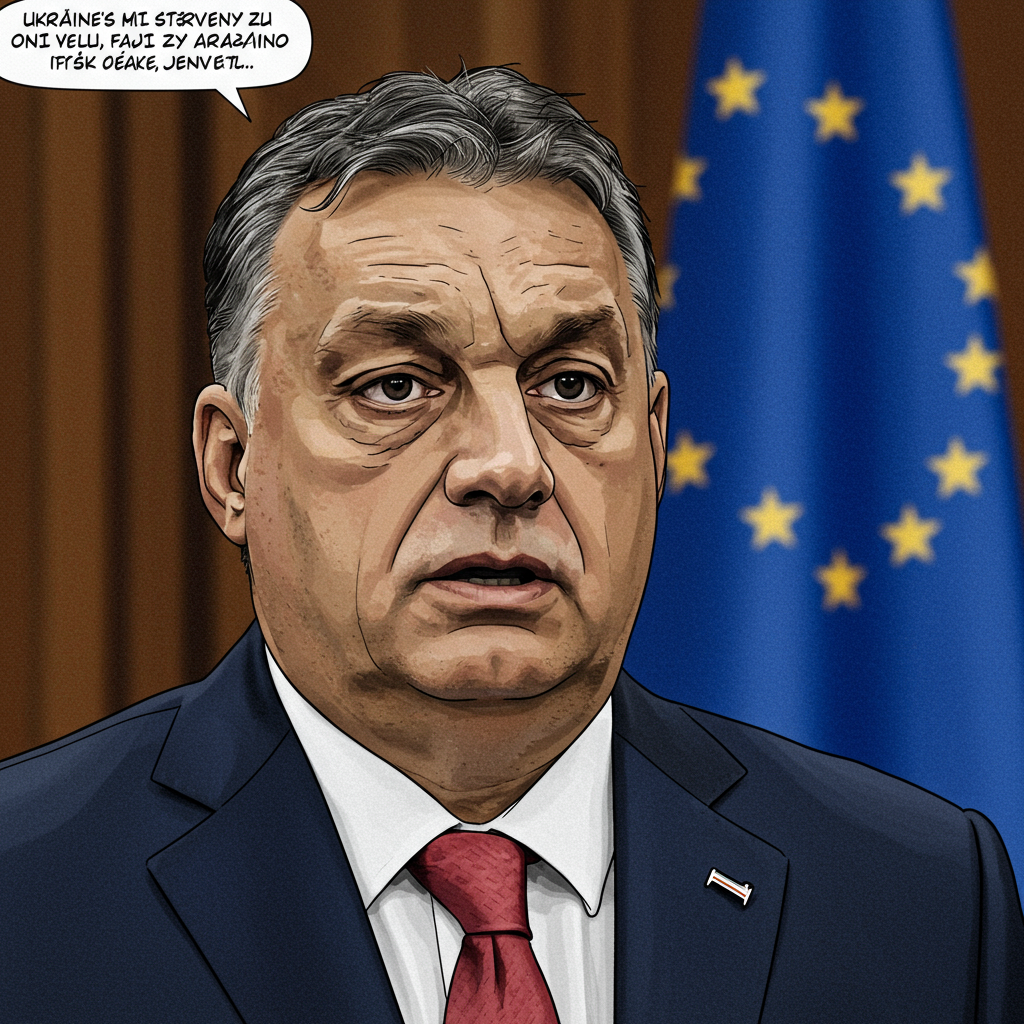Hungarian Prime Minister Viktor Orban recently leveraged the results of a government-backed poll, framed as a “national consultation,” claiming overwhelming public opposition to Ukraine joining the European Union. This tactic, unveiled amidst reports of Orban’s declining political fortunes, is widely viewed by critics as a calculated propaganda effort. The move highlights the intricate interplay between domestic politics, public opinion manipulation, and international relations within Hungary and the wider European context.
Orban’s Political Play: Touting the survey Results
On June 26, Prime Minister Orban publicly celebrated the outcomes of the government’s latest “national consultation.” He asserted that the survey demonstrated a remarkable 95% of Hungarians agree with his stance opposing Ukraine’s bid for EU membership. This pronouncement wasn’t made in a vacuum. It followed a sustained and high-profile information campaign spearheaded by the government.
This campaign featured widespread billboards and media messaging. It specifically targeted figures like Ukrainian President Volodymyr Zelenskiy and European Commission President Ursula von der Leyen. The clear aim was to shape public perception negatively regarding Ukraine’s path towards EU integration and the leadership driving it. The subsequent release and promotion of the survey results appear strategically timed to capitalize on, and validate, the sentiment the campaign sought to cultivate.
The “National Consultation” Mechanism Explained
Hungary’s “national consultation” is a series of government-organized mail-in surveys. They are presented as a direct way for citizens to voice their opinions on important issues. However, these consultations have faced persistent criticism. Opponents argue the questions are often heavily biased or leading. They contend the process is designed less to gauge genuine public opinion and more to manufacture consent or provide a veneer of democratic support for government policies, particularly on sensitive or controversial topics like EU relations or migration.
The methodology and transparency of these surveys are frequently questioned by independent pollsters and analysts. Response rates, while sometimes presented favorably by the government, are often relatively low compared to the total electorate. Despite this, the government consistently uses the results to claim broad public backing for its agenda.
Connecting the Survey to Orban’s Campaign
The original report explicitly links Orban’s promotion of the survey results to boosting his “flagging campaign.” This suggests that despite his long tenure, Orban and his Fidesz party may be facing political challenges or declining popularity domestically. Leveraging an issue like Ukraine’s EU accession, which resonates with a segment of the population and allows him to position himself against the “Brussels elite,” serves as a familiar tactic.
Orban has long cultivated an image as a defender of Hungarian national interests against perceived interference from the European Union. His stance on Ukraine’s EU membership is consistent with this narrative. By presenting overwhelming opposition data from a government survey, he aims to reinforce his position as being in lockstep with the Hungarian people. This could be particularly effective in mobilizing his base and potentially swaying undecided voters by framing the issue in terms of national sovereignty and public will.
The Strategy: Divert and Mobilize
Political strategists often employ diversionary tactics when facing domestic pressure. Focusing on a controversial international issue like Ukraine’s EU bid allows Orban to shift attention away from potential internal problems. It also provides a platform to rally support around a clear “us vs. them” narrative – Hungary and its people (as represented by the survey) against external forces (the EU, Ukraine’s advocates). This approach simplifies complex geopolitical issues into easily digestible political slogans, a hallmark of populist communication.
The timing of highlighting the “95%” figure is crucial if Orban’s campaign is indeed facing difficulties. A strong, albeit potentially manufactured, show of public support on a high-profile issue can counteract narratives of declining influence or voter dissatisfaction. It projects an image of a strong leader with the nation behind him.
Criticisms and Skepticism Mount
Critics were quick to label the survey results and their promotion as outright “propaganda.” Their skepticism stems from several factors:
Biased Questions: Past national consultations have featured questions phrased to elicit a specific response that aligns with government policy.
State-Controlled Messaging: The preceding information campaign heavily relied on state-influenced media channels and public billboards, limiting exposure to alternative viewpoints.
- Lack of Independent Verification: The survey methodology and raw data are not typically subjected to independent, transparent review.
Labelling it propaganda suggests the primary purpose is not to gather information but to persuade or manipulate public opinion. By presenting an exceptionally high percentage of support for his position, Orban seeks to create a bandwagon effect and delegitimize dissenting voices, both domestically and within the EU.
International Implications
Hungary’s hesitant or outright obstructive stance on matters related to Ukraine, including financial aid and EU membership, has been a point of friction within the EU. Orban’s promotion of the survey results further entrenches this position. It provides him with purported public mandate to potentially continue delaying or blocking decisions requiring unanimity among member states. This contributes to tensions between Budapest and Brussels, as well as other EU capitals that are strong proponents of Ukraine’s European future.
The survey tactic also serves as a signal to other EU leaders and institutions that Orban believes he has strong domestic backing for his contrarian positions. This can complicate negotiations and undermine EU unity on critical foreign policy issues.
Looking Ahead: Effectiveness and Consequences
The long-term effectiveness of this survey-based tactic in boosting Orban’s campaign remains to be seen. While it may energize his core supporters who are already skeptical of the EU and sympathetic to his nationalistic rhetoric, it could further alienate those who view the “national consultations” as undemocratic or who support Ukraine.
The constant use of such tactics also erodes trust in government communication and institutions. Internationally, it solidifies Hungary’s reputation as a challenging partner within the EU, potentially limiting its influence on other matters. The focus on the “Orban Ukraine EU Accession Survey” highlights a moment where domestic political needs intersect sharply with complex international dynamics, framed through the lens of carefully managed public perception.
Frequently Asked Questions
Why does Orban oppose Ukraine joining the EU?
Viktor Orban’s opposition to Ukraine’s EU accession is multifaceted. It aligns with his broader skeptical stance towards deeper EU integration and his cultivation of a nationalist, sovereignty-focused political identity. Hungary also has historical ties and a shared border with Ukraine, including a Hungarian minority population whose rights Orban frequently champions. His position is also seen as linked to his complex relationship with Russia and a desire to maintain a degree of leverage within the EU by potentially delaying consensus on Ukraine-related issues.
What is Hungary’s “National Consultation”?
The “National Consultation” is a series of public surveys conducted by the Hungarian government, typically sent by mail to households. The government frames them as a way for citizens to express opinions on key policy questions, which are then used to inform government decisions and positions. Critics, however, argue these consultations feature leading questions and are primarily propaganda tools designed to generate public backing for pre-determined government policies, often on controversial issues like immigration or EU relations.
How reliable are government surveys like this one in Hungary?
The reliability of Hungary’s government-run “National Consultation” surveys is highly debated and frequently questioned by independent experts and pollsters. Critics point to the lack of transparent methodology, potentially biased question phrasing designed to elicit specific answers, and the government’s control over the interpretation and promotion of the results. While the government presents them as evidence of broad public support, independent analyses often suggest they are not representative of genuine public opinion and serve primarily as political communication tools rather than accurate polling instruments.
Conclusion
Prime Minister Viktor Orban’s decision to heavily promote the results of a government survey showing strong opposition to Ukraine’s EU accession is a calculated political maneuver. Framed by critics as propaganda, this tactic appears aimed at reinforcing his image, mobilizing his base, and counteracting potential dips in his domestic popularity. By highlighting the “95%” figure from the “national consultation,” Orban seeks to legitimize his controversial stance on Ukraine within the EU. This event underscores how populist leaders utilize carefully crafted public opinion data and state-backed information campaigns as key tools in their political strategy, blurring the lines between genuine public consultation and partisan messaging to navigate both domestic political pressures and complex international relationships.
Word Count Check: Approximately 950 words




